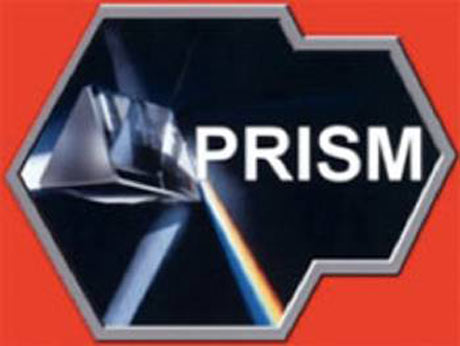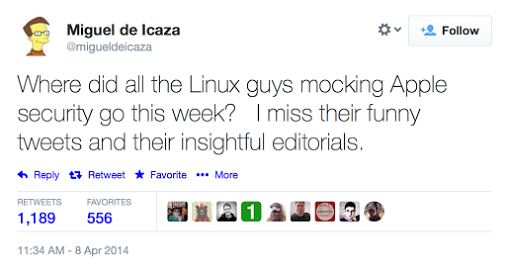04.11.14
Posted in Microsoft at 9:46 am by Dr. Roy Schestowitz
Everyone should get fired for buying into PRISM

Summary: The leaks from Edward Snowden show that rather than “nobody gets fired for buying Microsoft” we should adopt the “everyone should get fired for buying Microsoft” (the seminal company behind PRISM)
According to this post from Lauren Weinstein, one New York-based store learned the hard way that it should have stayed away from Microsoft. “The store has now suddenly closed,” he writes. “Apparently the new Microsoft software didn’t work out as hoped, at least as far as the storefront is concerned.”
What kind of a store chooses to rely on Microsoft for business? Probably the type of store owned by people who grew up with nothing but Windows and are sometimes shocked (paralysis) into thinking that nothing except Microsoft would be suitable. We see a lot of the same thinking in governments where, unlike when it comes to a private business, buyers are liable to citizens who foot the bill. In Australia, for example, politicians or their ‘technical’ staff have just chosen to be spied on by the NSA through Microsoft. And believe it or not, they even pay Microsoft for this ‘privilege’ to be spied on (well, the taxpayers are paying, without even the opportunity to vote on this matter). How negligent — to put it politely — must the CIO(s) have been?
As iophk put it: “Now they lost control over their data. In the EU the exit cost is taken into account when assessing the TCO. Here it looks like it wasn’t. Queensland could have saved more and still kept their data if they had moved to Apache OpenOffice or to LibreOffice.
Politicians within and outside the US should never host anything with Microsoft, ever. Microsoft is collaborating with the NSA, which spies not only on government officials in ‘ally’ countries but also inside the United States (as it recently confirmed). Software like Skype is a spy and Microsoft’s E-mail hosting is known to be spied on by Microsoft for business reasons, not security reasons. It’s a crime, but nobody is in jail. It’s done in collusion with the state.
CIOs and business heads who choose Microsoft despite all that is known (especially after the NSA leaks) probably deserve to be fired. Watch how DPI giant BT (which also assists in drone assassinations) falsely claims access to Microsoft Azure to be “secure” (a ‘secure’ link to GCHQ, NSA, etc. through abusive monopolist Microsoft). This is PRISM in disguise of “security”.
Nobody should ever host anything at all on Microsoft servers. Those who do ‘on behalf’ of citizens (and at their expense) certainly don’t deserve to keep their jobs. They are aiding illegal surveillance and their choice is also technically unwise (which is another issue that we tackled in past years). █
Permalink
 Send this to a friend
Send this to a friend
Posted in FUD, GNU/Linux, Microsoft, Windows at 8:43 am by Dr. Roy Schestowitz

Summary: Government the only likely entity to exploit Heartbleed®, but Microsoft and its peripheral PR apparatus try to scare everyone away from GNU/Linux
A LOT of concerned people, including large businesses, are moving to GNU/Linux for improved security right now (I am aware of some businesses but cannot name them), bearing in mind that Windows XP is no longer secure even in Microsoft’s eyes. Microsoft put back doors in Windows (for governments), so when even Microsoft claims something to be not secure, then it should be ever more alarming.
We are still seeing many articles about migration from Windows XP to GNU/Linux, not just in blogs of GNU/Linux advocates [1,2,3] but also in Microsoft-friendly news sites [4], widely-distributed publications like The Economist [5] (typically GNU/Linux-hostile or just ignoring GNU/Linux), GNU/Linux-oriented sites [6,7], and the Linux Foundation [8]. There are other general news sites [9-12] that cover this (suggesting GNU/Linux as a replacement for XP) and on the other hand there are those in the GNU/Linux world who are apathetic about it [13]. The common theme, however, is rather clear. People are being advised to explore GNU/Linux and jump off the treadmill of Windows ‘upgrades’. Microsoft must be worried. There are many confirmatory indicators of this worry — ones that we covered before.
We recently saw a lot of FUD over GNU/Linux security coming from Microsoft-linked sources, basically inciting/creating unnecessary panic by twisting facts and never mentioning Microsoft’s security issues (some are there by design, like NSA back doors or even FBI entry points).
Someone who worked for the FBI (worse than the NSA by some criteria) and then Microsoft (the back doors partner of the NSA) then revealed Heartbleed®, on the very same date that Windows XP is officially dead. What’s the likelihood that this was a coincidence? Microsoft’s ‘former’ security chief sure helped distract from stuff like the articles about moving to GNU/Linux for security. If it was a stunt, then it sure worked like a charm.
Heartbleed® does not seem like the work of secret agencies [14], but it sure helps them a lot [15], undermining activism [16] and Free software [17], as well as security in Apple and Microsoft products (they use OpenSSL too and they still have no patches, unlike GNU/Linux distributions). Pay attention to how Microsoft boosters like Miguel de Icaza twist this to look like a problem only for GNU/Linux. Microsoft propagandist and partner Tony Bradley (he works with Microsoft) plants some FOSS-hostile articles to that effect [18] as well. Microsoft must be having a day field with its PR/propaganda agents. As we expected, Microsoft partners now spread articles full of FUD — stuff which was published in a timely fashion by a Microsoft-linked firm, exactly upon Windows XP EOL. Watch some timely new revisionism (PR) from Microsoft Peter, using false claims (changing history) to push people to ‘upgrade’ from XP to Vista 8. This is not journalism; it’s advertising from a Microsoft booster who infiltrated a news site. Many sites are still affected by Heartbleed®, but reports from Microsoft-friendly journalists (who were behind some of the previous security smears against GNU/Linux) exaggerate the numbers. At my job, for example, no Web site was found to be affected by Heartbleed® (one can check this online [19]). The main source of danger right now is government spies [20,21] (or government crackers). Those who understand the technical details [20] even guess that government actors may have played a role in putting the bug there [22]. The FSF responded by highlighting the fact that proprietary system have back doors by design [23] (the FSF says “Microsoft are even sharing bugs with others like the NSA without fixing them”) and other GNU/Linux-oriented sites did cover the incident, but not with an excessive sense of panic [24-29], unlike Gates-funded papers [30].
To summarise, what we are dealing with here is an incident where the firm of Microsoft’s ‘former’ security chief shares bugs with the whole world irresponsibly (many sites had not been secured by that time in which his firm decided to release details, exactly when XP hits EOL). And having checked customers’ systems overnight, I found that nothing was affected by this OpenSSL bug. Irresponsible reporting from Microsoft-friendly journalists (with history) claims — falsely — that 2/3 of the Web is affected. Talk about appalling FUD. Wow!
One sure thing is, Chromebook sales are not going to be stopped by it, not even by Microsoft's attack ads (hypocritical FUD is now central to Microsoft’s official strategy and there is no hiding it). █
Related/contextual items from the news:
-
-
-
If you think you can’t do without XP, think again. I have not touched an XP machine or any other OS from M$ for years now because all my PCs run GNU/Linux. If you think you can’t do without some application that only runs on XP or any other OS from M$, think again. Many millions of users of GNU/Linux don’t have those problems that M$ causes: malware, spyware, re-re-reboots, and lock-in.
-
Linux is frequently touted as one of the most successful open-source projects ever. Since its release in the 90s, the versatile OS has gradually become more popular with users. With a 1.49% market share, Linux is now rated the third-most popular PC operating system after Windows and Mac OS X operating systems.
-
But to what? For those determined to stay in the Microsoft camp, forget Windows 8 or 8.1. Not only do they demand too much in the way of hardware, both have been been written off as a debacle as bad as the Windows Vista disaster. With their touch-based design, they require users to do things differently from the way they are familiar with. Microsoft is now hurrying out Windows 9 in a bid to pre-empt a mass migration to Linux or Macintosh.
-
Microsoft has ended its support for Windows XP and most of you might not even care but for some of you who do care and understand the complications involved in using a discontinued piece of software, you are in for a change. You can either install already outdated Windows 7, no one’s favourite Windows 8 or you can join the elite group of Linux users by installing on of the many available flavours of Linux.
-
One reason technology choices are so difficult is technology is always a work in progress; your one choice has lasting consequences since the technology rarely ever lives on its own, and most good technology is never done — that is unless you’re Windows XP. As most of us know, Microsoft today is turning off support for Windows XP. That means that roughly 30 percent of all Windows users will cease to get security updates and other ongoing maintenance. Since hackers disproportionately target Windows products, this is a big deal.
-
-
RMS is the guru of computing freedom, and a great source. He started the “hack” movement as an outsider inside MIT during the Vietnam protesting era, and founded both the GNU software movement and the Free S/W Foundation. He seems (to me) to be highly-influenced by socialist ideals.
-
In this case, Linux Mint 16 is the perfect candidate for a Windows 7 look-alike transformation and the Windows7 Pack (Cinnamon+ GTK3/2) theme works like a charm. You will have to move the files manually in the appropriate folders, but the themes should be easy to activate.
-
To simplify the downloading and installing, collections of these many software components, called “distributions“, are available ready for users to download and start using straight away.
-
On Tuesday, Microsoft finally end support for one of its most successful operating systems, the 13-year-old Windows XP. Owing to this, there will no longer be any official security updates and bug fixes from the company, meaning those who continue to use the OS will be left vulnerable to security threats.
-
Frankly, I’ve never liked Windows XP. I found the interface to be an eyesore way back when it was first released and using it never improved the experience. I’m very glad to see that it’s going away finally, it’s demise has been been long overdue. I’m rather surprised that it has hung on this long, given that it was never all that anyway. It’s almost become like some sort of a disease you can’t quite get rid of, it just goes on and on and on.
-
The Heartbleed bug in OpenSSL wasn’t placed there deliberately, according to the coder responsible for the mistake.
-
“The best guess is that the only ones exploiting this bug are spy agencies, if anyone at all.”
-
-
-
-
-
-
-
At this point, the probability is close to one that every target has had its private keys extracted by multiple intelligence agencies. The real question is whether or not someone deliberately inserted this bug into OpenSSL, and has had two years of unfettered access to everything. My guess is accident, but I have no proof.
-
-
-
-
-
-
-
-
-
GOOGLE HAS BEEN QUICK to jump on the demise of Windows XP, and is looking to persuade businesses still running the operating system to buy Google Chromebooks instead.
Permalink
 Send this to a friend
Send this to a friend
Posted in Antitrust, Hardware, Microsoft, Windows at 7:51 am by Dr. Roy Schestowitz

Summary: Reports of “loss of Linux dual-booting” due to Windows Update are investigated further; FSF award to Garrett faces opposition
IT WAS recently reported in Reddit that UEFI was used by Microsoft Windows to wipe out GNU/Linux. Windows Update rendered GNU/Linux unbootable and allegedly turned ‘secure’ boot on to achieve this.
According to this new analysis from Jamie the UEFI explorer, it’s not an isolated incident. He starts by stating: “I can finally report that yes, there is a problem — but it’s generally not as serious as has been reported.” He also writes: “While I found that I was able to ‘fix’ the loss of Linux dual-booting on both of my systems, I am NOT trying to say that everyone who has posted claims about dual-boot being ‘destroyed’ by Windows Update is wrong. I certainly have enough experience with UEFI boot configuration to know that all sorts of strange things are possible, and it may well be that some systems, with some configurations, really do get more seriously damaged by Windows Update than mine have. One very obvious example might be that the Linux items could get deleted from the boot object list. If that happened you would have to use efibootmgr to put them back again.”
But who would know how to do this and how many people would just turn away from GNU/Linux at this stage? This is why UEFI should face a boycott and antitrust complaints against Microsoft get bolstered. I wholeheartedly disgree with FSF for giving Garrett an award. This can be a PR disaster waiting to happen, a bit like Miguel de Icaza and Theo de Raadt and getting such an award before their FSF bashing. Apparently I am not alone in disagreeing with the FSF; Sam Varghese expressed similar concerns, having opposed ‘secure’ boot for quite some time along with many others. He writes: “The Free Software Foundation has given an annual award this year for work that enslaves people to the demands of Microsoft – something that flies in the face of all that the organisation has stood for since its founding.”
This has indeed been a bizarre move and it can help weaken existing complaints (in Europe) over Microsoft’s UEFI tricks. █
Permalink
 Send this to a friend
Send this to a friend
Posted in FUD, Microsoft, Mono at 6:51 am by Dr. Roy Schestowitz

Summary: Days after signing yet another alliance/partnership with Microsoft Miguel de Icaza shows the world just how much he ‘loves’ Free software
THERE IS already some (foreseen) Microsoft propaganda over an OpenSSL flaw. And as someone in the above thread points out: “Funny since openssl was patched in Linux in less than an hour and it affects Microsoft too, which doesn’t have a patch yet… Where is everyone screaming at Microsoft? Propaganda, propaganda everywhere!”
As we’ll show later today, a lot of anti-FOSS propaganda of this kind has come out and it typically comes from people who are professionally tied to Microsoft, such as Miguel de Icaza. Heck, even the firm that reported the bug is intrinsically tied to Microsoft.
Miguel de Icaza is promoting Microsoft again this week. He does not even hide it. He writes: “We are very excited about the release of [Microsoft] Roslyn, it is an amazing piece of technology and one of the most sophisticated compiler designs available. A great place to learn great C# idioms and best practices [5], and a great foundation for great tooling for C# and VB.”
Next time you hear of Miguel de Icaza remember that he is working with Microsoft, based on some of the latest news. Xamarin should be treated as nothing more than a department of Microsoft. █
Permalink
 Send this to a friend
Send this to a friend
Posted in Bill Gates, Fraud at 6:31 am by Dr. Roy Schestowitz
Lobbying and monopolisation money at work

Summary: A story from an insider is shared with Techrights, shedding light on abuses and coverup (with NDA)
OUR VERY MANY GATES-THEMED POSTS which outline lesser-known facts about the Gates Foundation have occasionally led to us receiving mail from people who saw the same facts from the inside. They agree with the analysis and they want to say more even though they are often unable to do so, due to gag orders. Some of them, understandably enough, do so anonymously and some ask for their identity not to be publicly known (except by the NSA of course, for it is spying on everyone).
It is rather evident that more and more people are catching up and waking up to the facts. Here for example is a new public petition titled “Bill Gates: Stop investing in the private prison industry!”
It says that “[t]he Bill and Melinda Gates Foundation Trust has invested more than $2 million in GEO Group, one of the largest and most abusive private prison corporations in the United States,” but it seems not to know that this practice is quite common for Gates, who also invests in G4S and even worse companies whose role is to crush society on behalf of plutocrats like Gates himself. Gates, an NSA proponent, actually profits from this. So what’s not to like? Profiting and oppressing at the same time.
The plot of Gates will suffer (for a change) when even people from within his camp decide to defect. There are numerous such people who came out (on the record, publicly), but obviously that’s not enough because Gates continues to hoard and expand his personal wealth at an alarming rate (at other people’s expense while pretending to give away his wealth).
Here is a redacted portion of correspondence I have had with one such person (redaction intended only to hide the identity of the person). This is only days old:
> Dr. Schestowitz,
>
> If I knew about a Gates-backed NGO that was intentionally wasting
> funds to try to reinvent technology rather than expanding it for
> malaria and clinics in low-resource settings, what would I do about
> it?
>
> This group has burned through maybe [redacted] a year with zero
> viable technology to help international clinics or even licenseable
> products which would be consistent with the organization mission.
>
> The bottom line of this is PHDs right out of school who have never
> seen clinics in the 3rd world or how simple technologies must be to
> work there, and too arrogant to ask the people in the field or
> spend time in those countries to build something that can help.
>
> What do you recommend?
I covered such examples over the years. I wrote ~200 articles about
the Gates Foundation. If possible, can you provide more details from
which I’ll be able to construct an article? There is scarce
documentation of the failed cases because Gates spends, on average,
around 300 million dollars per year on press alone (i.e. on PR),
beating the criticism only with a staggering amount of puff pieces
from blogs, news sites and panels that he pays for this.
> Roy,
>
> Thanks for the reply. I have an NDA with this group and don’t want
> to be sued. That is part of their power.
>
> The did directly throw away a technology that had been proven to
> work in international clinics for probably the most important
> disease and decided that because they were PhD’s newly out of
> school that they could build a viable product without consulting
> the people in African/Asian/Indian clinics, people from other NGO’s
> that have actually rolled out products that are making a
> difference, rewriting years worth of incredibly complicated
> algorithms, using a device that costs [redacted] that would never work
> or be affordable by clinics, etc.
>
> Is there a group that oversees the Gates funds. I work with a
> leading NGO also in [redacted] that uses their much inferior funding
> to truly achieve impact in low resource areas, looks for meaningful
> teammate organizations to ensure success, etc.
>
> What I saw from this Gates group that’s mission statement is to
> achieve impact and working technology to help in needful areas is
> nothing short of fraud or misappropriation of funds.
>
> Is there any group that oversees these guys?
>
> Thanks!
Thanks for the additional information.
Gates Foundation is accountable mostly to itself, AFAIK. Over the
years I saw many groups, including former partners, complaining about
allocation of funds. This is documented by the press, too. In many
cases, the funds disguise interest in patents and monopolisation of
so-called solutions for the crowd Gates does not understand (can the
richest person from the richest background since childhood really
speak out for the poor and grasp their woes?). In some cases, the
Gates Foundation claims “transparency” and releases face-saving
reports when partners (or former partners) complain. For this too I
can provide lots of references as I covered it at the time. I no
longer have time to keep up with Gates, but last I saw he kept looking
for ways to lobby politicians to pass taxpayers money to his pet
projects, including GMO and GSK-connected patent-boosting
investments/clinical trials on poor people.
Anyway, accountability assumes that there is separation between the
corporate side and the federal side, and that one can monitor the
other. But the boundaries have been blurred and there is now a
marriage of tax-exempt ‘charity’, politics, and industrial partners. I
fear that the only way to fight back is to inform civil rights groups
and inform the public. Over the years I found that more and more
people recognise the Gates Foundation for what it really is. It
doesn’t get a free pass.
If you want to shed light on this anonymously, without revealing your
identity, the product, and company names, that would probably be
possible. As you did not encrypt your messages or used a remailer, you
can assume the intel’ community is already aware of this
communication, but that does not automatically extend to the private
sector.
I am eager to shed light on this without exposing any identity. I have
done this dozens of times over the years and never caused any
retribution/trouble my sources. It is up to you how you want to deal
with the situation, but all I can say at this stage is, the system has
been set up in such a way that there is no credible body to report
this to. A lot of institutions/non-profits blindly assume benevolence
on the part of those who fund them*. The only time I see foundations
being held accountable is when there’s real journalism, such as what
LA Times did 7 years ago.
___
*Some institutions/non-profits, including USAID for example, are de
facto partners of these foundations, helping not only GMO monopolies
but also the overthrow of “bad” leaders in Latin America.
> Roy,
>
> You know that any use of packet sniffing to intercept personal
> email is illegal and not usable, anyone could spoof an email
> account.
>
> Your interest in telling the truth about such a goliath is very
> admirable, so I decided not to hide my email to you. I have used
> relay servers, etc. to send feedback to the Gates Foundation.
>
> It is simply too dangerous for an individual to tell the truth when
> the reality of these funds has nothing to do with their mission
> statements and they have no interest in results, honesty, or
> ethics.
>
> One example is the multiple millions spent on “setting up laser
> fences over all of Sub-Saharan Africa”, not doing any research on
> the practicality of putting such devices all over a continent, or
> that the vector for the disease evolves so quickly that going under
> or over the fences would happen very quickly.
>
> It would have been more practical to spend the millions on a time
> machine to try to go back in time to the beginning of the disease.
> 
>
> Unless there are investors in these funds who want actual returns
> or any even occasional auditing to look at funds spent versus
> tangible results, it appears that it is just a tragic loss for the
> people of the world who could be helped.
>
> No money is spent on researching what works in the field, and the
> “engineers” or “scientists” frittering away the funds and the
> years without doing any research on what works in a low resource
> setting.
>
> So, you have never had contact with any fund investors, governing
> bodies, individuals at the parent Gates Foundation that audit
> individual funds, etc.?
>
> If you do find those kind of people I would give them some
> information. Unfortunately I don’t think that a single newspaper
> article would make a difference.
>
> Thanks.
No single article can make a huge difference, but every little helps.
Due to the disproportionate distribution of wealth, few people now
control the press and can overwhelm real journalism with a barrage of
puff pieces and placements (paid for). The NSA leaks showed that even
nearly a year of leaks with huge impact on public views hardly changed
anything in policy (there is now, finally, talk about ‘reform’, but it
is a bogus reform).
The Gates Foundation has shown over the years that it is very
sensitive about critics. It spies on them and keeps track of coverage.
There is dedicated staff for it; usually it’s called “advocacy”
(euphemistically) and “communication” (meaning PR). I have seen cases
where criticism has been so effective that the foundation changed its
strategy (e.g. won’t support tobacco anymore) or stepped out (e.g.
Melinda leaving Washington Post board after being disgraced for
conflict of interests).
I think that assessors of grants, proposals etc. are hired by Gates to
often align with financial interests (investments) of the foundation,
e.g. people from Monsanto, GSK, and so on. So in order to reach out to
those whose hands are in the cookie jar you’d probably have to go into
the territories of the foundation. There is no proper separability or
oversight there.
What PR agencies are able to do is basically ‘plant’ a lot of fake (ghostwritten) stories in the press (which Gates pays around $300,000,000 per year) to marginalise the true stories (from insiders and direct eyewitnesses), such as the story above. █
Permalink
 Send this to a friend
Send this to a friend






















 Content is available under CC-BY-SA
Content is available under CC-BY-SA